- Home
- E. M. Foner
Word Night on Union Station (EarthCent Ambassador Book 9) Page 2
Word Night on Union Station (EarthCent Ambassador Book 9) Read online
Page 2
“Ah, you’re correct. I spoke without thinking,” the Maker admitted. “I ended up giving them a variety of cleaning products. Very practical.”
Aisha stuck her head out of the kitchen and looked around the room. “You’re home. I started cooking late because Paul’s hung up at work and Dorothy is skipping. I gave Samuel a sandwich when he got back from dance practice.”
“Thank you, Aisha. By the way, the president of EarthCent is planning an official visit to Union Station and he wants to present you with a medal.”
“Does he intend to do it on my show for publicity? I’d have to check with the Grenouthians first. There was some specific language in the contract about letting politicians appear and I’d hate to have to give equal time to the other species. The children would find it awfully boring.”
Two
Dorothy sat on the counter of the lost-and-found, grilling Flazint about the details of the Frunge girl’s latest suitor. “And then he gave you a grow-lamp for your birthday?”
“It’s specially tuned for hair vines,” Flazint replied. “Our deck lighting is alright for most things, but it doesn’t penetrate to the roots the way focused infrared does. It’s not just for the vines, either. Frunge who try to get by on the deck lighting usually end up with dry scalps, and you know what that means.”
“Dandruff.” Dorothy nodded knowledgably. “But isn’t a grow-lamp like a serious commitment? Do you think he’s going to pop the question?”
“You mean, ask his parents to ask my parents to ask our ancestors to ask his ancestors to make an offer?”
“Uh, I guess. Do you mean your ancestors have veto power over who you get to marry?”
“Of course,” Flazint said. “Do you mean that Humans make their children do everything themselves? Unless you’ve been married before, how would you know what contract terms to ask for?”
“Contract?”
Flazint stared at Dorothy in disbelief. “Are you saying that Humans get married without negotiating a contract first? How do you know who is responsible for what?”
“I guess some humans have contracts, like religious things. But I believe that as long as there’s love, everything else will work itself out.”
“Wow! You guys really are backwards. No offense, I mean,” she added hastily. “So are you serious with this David guy?”
“I don’t know. I only turned eighteen last week and I’m not in any hurry. My mom didn’t marry until she was thirty-five.”
“And you guys live to, what? Three hundred? Four hundred?”
“More like eighty or ninety,” Dorothy said, sounding a bit embarrassed at her deficient longevity. “Libby says that in a few hundred thousand years, we’ll probably live just as long as the Frunge or the Drazens, but the only way to do it now is with yucky tech stuff.”
“I didn’t know,” Flazint said, tapping her own chin with a knuckle, the deepest apology gesture used by her people. “We didn’t do Human biology in school. I always thought it was because of anti-Human bias, but now I wonder if they just didn’t want to shock us. Anyway, I guess that explains your courting.”
“What do you mean?”
“You don’t have any time to waste. Our contract negotiations for a marriage can stretch out for decades. You visited my family’s house. Don’t you remember the way my ancestors talked?”
“It was more like groaning. Really slow.”
“And they aren’t ambulatory, so it all has to be done through sending messages back and forth. Most families use the shrubs for that, and I’m sure you can imagine how unreliable kids are at that age. It’s like playing the old classroom game where children in a circle whisper a message to each other and it comes back all garbled.”
“I guess every species has its own problems. Anyway, thanks for agreeing to cover for me while I’m poking around out back. Libby gave permission for a friend to come and help me, but Chance has a bit of an issue with showing up on time.”
“Didn’t you say that she’s an artificial person? How is she going to help with your fashion project?”
“Chance is the most stylish sentient I’ve ever met, and that includes the Vergallians who show up for Mom’s embassy parties. She also knows a lot about travel clothes and accessories because she was always on the move in her early years when she was, er…” Dorothy trailed off after failing to come up with a diplomatic way to express that the artificial person had skipped out on her body mortgage payments.
“You’re so lucky that you can design your own curriculum at the Open University,” Flazint said enviously. “My ancestors and my parents choose all of the courses for me. I’ll be lucky if I can take some electives in my last year.”
“But I thought you wanted to be a metallurgist. You always sound so excited when you tell me you spotted a new alien alloy in some item that shows up in the bins.”
“I do, but I wish we had more hands-on work, like the cool bags and dresses you’re always making. So far it’s all materials science and chemistry, with a little engineering thrown in just to make the tests harder. I want to drop forge something!”
“I have to take theory courses too,” Dorothy commiserated. “Do I really need to know the difference between additive color and subtractive color to design a handbag? And even when I get to make something for school, it has to be so precise, and then I have to record all of the fiddly little details like it’s a lab experiment. If I wanted black polish a few years ago, I went to the Shuk and bought a can for two creds. Last week I had to go to a certified manufacturing supplier, and they’re like, ‘We need the color coordinates,’ and I’m like, ‘Black, please,’ but the Dollnick clerk just turned his back on me and walked away.”
“They’re so rude,” Flazint sympathized.
“So I pull up the color theory course addendum on my tab, and it turns out that humans have four different systems for color coordinates, none of which even translate directly into Dollnick. So I call the clerk back, and I’m like, ‘Just give me the blackest one, all zeros.’ He brings out this little can, a tenth of the size of what I’d get at the Shuk, and charges me twelve creds! When I get home and open it, there’s no pigment at all. It’s completely clear.”
“What happened then?”
“Well, I checked with Libby, and it turns out that there’s a standard pigment system used by all of the alien manufacturers which defines colors by what you put in, so all zeros is supposed to be clear. But I know that Dollnick understood what I wanted.”
“Ouch,” Flazint said. “At least it wasn’t a big can. I never would have guessed that polish or paint could be as technical as steel.”
“Anyway, I’m not really that interested in the manufacturing end, but everybody except for Chance says that I have to study it or I could end up designing stuff that can’t be produced commercially. I mean, if I can make it myself, doesn’t that prove that it’s doable?”
“Well, they have a point,” the Frunge girl said. “I could start with a block of silver and file it into the shape of a spoon, but you wouldn’t want to go into business making cutlery that way.”
“Maybe not,” Dorothy admitted. “But the really high-end stuff usually is hand-crafted, and if you can earn as much selling one bespoke spoon as a thousand mass-manufactured ones, you’ll save a lot on packaging materials.”
“That’s how I look at it,” Chance declared, hopping onto the counter from the customer side. She was testing the stealth-mode upgrade Thomas had ordered on trial evaluation from Quick-U, and neither of the girls had heard the artificial person enter the lost-and-found. Chance swung her legs over the counter, showing off a new pair of Vergallian walking heels in the process, and ended up sitting side-by-side with Dorothy. The two of them looked like classmates.
“Wow, great shoes,” Flazint said. “I wish I could wear something like that, but our feet are a bit, you know.”
“A bit rooty,” Chance completed the Frunge girl’s thought. “Still, it’s better than being a Verlock fe
male. They weigh so much that they can’t wear heels for fear that they’ll poke holes in the deck.”
“That’s not true,” Dorothy scolded her friend. “And I don’t see why a few vestigial roots should keep you from wearing stylish shoes, Flazint. You don’t have to add dirt to them anymore, do you?”
“Not since I was a shrub,” the Frunge girl confirmed.
“So why do all of your shoes look like construction boots?”
“I guess I never really thought about it. We kind of focus on our hair vines because that’s what the guys notice.”
“Males have no fashion sense whatsoever,” Chance declared. “Thomas only owns two pairs of dancing shoes, and even that’s just because I bought him the second pair after I caught him trying to cover scuff marks on the old ones with my black lipstick.”
“Ugh,” both of the girls said together.
“What’s worse is that he doesn’t even notice my shoes unless I grind a heel into his toe to make him look. I mean, when we were shopping for a place to move in together, he wouldn’t even agree to a walk-in closet.”
“But you found a place a year ago,” Dorothy said. “What did you do with all your stuff?”
“I convinced him we needed a two-bedroom in case the relationship didn’t work out, and then I commandeered one bedroom for a closet,” Chance explained.
“So what are you guys hoping to find on the old shelves?” Flazint asked. “If you go back more than three rows, there won’t even be any human stuff because you weren’t part of the tunnel network back then.”
“It’s sort of my grandmother’s idea,” Dorothy said. “She told me that when she married my grandfather, he had a couple of suits passed down from his grandfather that he kept in mothballs. Human men have this weird theory that fashions just repeat themselves, so if you hold on to well-made clothes long enough they’ll eventually come back into style again.”
“So you do get career guidance from your ancestors,” Flazint said, nodding her head in approval.
“Did your grandfather ever get to wear those suits?” Chance asked.
“Not if my grandmother had anything to say about it. But the point is, the lost-and-found shelves hold samples from almost six thousand years of alien fashions. I thought it would make an interesting research paper to see how they changed over that time and whether any of them really did repeat.”
“Cool,” Flazint said. “Let me know if you need anything from the cataloging system, Chance. I don’t think it will respond to your voice because you’re not an employee. Did Dorothy explain the system?”
“Maybe once or twice,” the artificial person said, winking at the Frunge girl. “Shall we start by going back a couple hundred years at a time? Most alien fashions don’t change that fast, though the Vergallians are the exception that makes the rule.”
Dorothy led Chance around the side of the track system for the shelves and counted off four ‘S’ curves before turning into a loop. The shelving units were one-sided, like bookcases, so there were full shelves on both sides of the aisle. If they had entered the loops from the other side of the room, they would have seen nothing but the closed backs of the shelving units.
“Remember,” Dorothy cautioned the artificial person, who had already begun rummaging through the lower shelves. “Anything you pull off the shelf you have to put back exactly where you found it or it will get lost. If you’re not sure what something is and you want to find out, just make a note of the shelving location and then we can ask the cataloging system.”
“Check this out,” Chance said, pulling a glittering red cloak from the shelf. The elegant garment might have been constructed from tiny links of a copper alloy, like an eveningwear version of chainmail. “I saw a humanoid wearing one of these in an orbital bar one time, though I can’t remember the species.” The artificial person twirled once or twice to show off the cloak, then tossed it carelessly back into a random opening.
“Is that where you found it?” Dorothy asked nervously.
“What? Oh, maybe not. Let’s see, I think—a formal ball gown!” Chance interrupted herself, pulling a silky black dress from the shelf. She held it against her front, and the cloth flowed over the artificial person’s ample curves like a liquid. “It’s practically my size too. Can I have it? Libby, will you sell it to me?”
“The chainmail cloak is from location ISA 63/2, Dorothy,” the Stryx librarian said, pointedly ignoring the artificial person. “You did promise to keep things tidy.”
“I’ll do it, I’ll do it.” Chance retrieved the red metal cloak and put it back in the proper spot. “Now can I please have this gown?” she pleaded. “I’ve never seen anything like it. I can’t believe any woman could have left it behind accidentally so she must have died or something.”
“You heard how the system works,” Libby responded. “Tell Flazint where you found it and we’ll trace the ownership chain.”
Chance practically sprinted for the front counter, moving amazingly fast in her heels.
“Don’t encourage her,” Dorothy said to Libby, as she followed her artificial friend at a more sedate pace. “This wasn’t supposed to be a shopping trip.”
“Trust me,” Libby replied mysteriously.
Flazint was just finishing up with a customer when Dorothy reached the front desk. Chance waited impatiently at the cataloging turntable with the liquid black gown.
“I found it at JOB 40/13,” the artificial person said, handing the dress to the Frunge girl.
Flazint half-placed, half-poured the liquid-like cloth onto the turntable, and instructed the cataloging system, “Identify object from JOB 40/13.”
“Sharf death shroud.”
“Ew,” Flazint said, backing away from the turntable and turning to Chance. “You pick it up.”
Chance shook her head vigorously from side to side.
“Libby?” Dorothy asked. “Do you have imaging from when the gown was discovered? Is it, uh, used?”
“Low resolution only,” Libby replied, and a grainy hologram popped into view over the turntable. A Sharf corpse was shown lying on a gurney, dressed in a liquid black gown that detailed every protruding rib. Her wilted eye-stalks slumped almost to the neckline. A number of somber mourners surrounded the deceased.
“Double ew,” Chance squealed, moving further away.
The hologram continued to play, showing the body being loaded into a sort of a launching tube feet-first. There was a whooshing noise, the light over the tube door turned green, and the party of mourners moved away.
“Fast forwarding,” Libby said.
The scene didn’t change, but a maintenance bot came into the picture and opened the ejection tube door. The black garment practically poured out onto the floor. The bot looked at it for a moment, and then looked into the tube, as if it was considering putting the shroud back where it came from and flushing it into space. Then the bot reached down with a pincer and the hologram blinked out.
“Is it safe to handle?” Dorothy asked in resignation.
“Yes,” Libby said. “You wouldn’t be affected by Sharf pathogens even if they were fresh, and the gown has been on the shelves for over two hundred years. But it’s clear it will never be claimed, so you can just tip it into one of the blue bins and let the bots recycle it. Unless you still want it, Chance,” the Stryx librarian offered disingenuously.
“Ugh,” the artificial person said. “I’ll be back in a minute. I’m going to find somewhere to wash my hands.”
Dorothy sighed and picked up the blue recycling bin, holding it against the edge of the counter with her body. Then she took a crumpled ball of aluminum foil that one of the bots had mistaken as potential treasure and used it to scrape the gown off the turntable and into the bin.
By the end of Flazint’s shift, Dorothy and a much-subdued Chance had identified a fashion trend in Horten millinery that neither of them would have noticed without six thousand years of widely spaced samples. The basic shape of the hats had changed v
ery little, mainly variations in the crown, but what started as a veil on the front, slowly evolved into a split veil. From there, it became a half-veil with a half-hatband, then a full hatband with no veil, then a hatband with a tail, then a double-tail with no hatband. Successive generations of Horten milliners had succeeded in creating demand for new products without changing the materials needed to make a hat.
“Next time we’ll look at travel accessories,” Dorothy told Chance. “We can stick with the stuff that you can see on the shelves until you’re ready to start touching things again.”
“I’ll get over it, I just need something to cheer me up,” the artificial person said. “Which reminds me, there’s a party this weekend some of my dance friends are throwing. It’ll be lots of artists and musicians. Both of you should come.”
“Can I bring David too?” Dorothy asked immediately.
“Of course, they welcome everybody. You might want to warn him to bring his nose plugs, though.”
“Is there something wrong with the air?”
“If they’re artists, maybe they don’t bathe,” Flazint interjected.
“It’s just that some of them smoke stuff, use vaporizers, you know,” Chance explained. “They’re great people, but there’s a bit of a recreational drug culture going on there.”
“Oh,” Dorothy said. She’d heard about parties like this from her Open University classmates but none of them ever seemed to get invited. “I guess if David is willing, I should go once just to see what it’s like.”
“Have a good time,” Flazint said. “There’s no way I’m risking my hair vines at some party where people are smoking and using drug vaporizers. I’ve heard it stunts budding.”
Three
“Is Jeeves hiding somewhere?” Blythe asked. She ostentatiously looked under the conference table in the EarthCent Intelligence meeting room to check if the Stryx was lurking out of sight.
“Did you invite him?” Chastity inquired.
“It didn’t occur to me to bother. He usually invites himself.”

 Last Night on Union Station (EarthCent Ambassador Book 16)
Last Night on Union Station (EarthCent Ambassador Book 16) Empire Night on Union Station (EarthCent Ambassador Book 18)
Empire Night on Union Station (EarthCent Ambassador Book 18)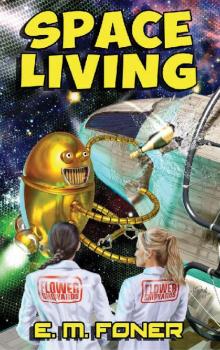 Space Living (EarthCent Universe Book 4)
Space Living (EarthCent Universe Book 4) Review Night on Union Station (EarthCent Ambassador Book 11)
Review Night on Union Station (EarthCent Ambassador Book 11)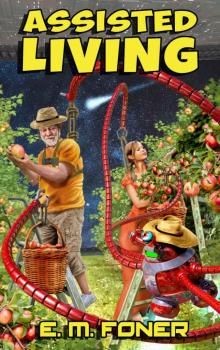 Assisted Living
Assisted Living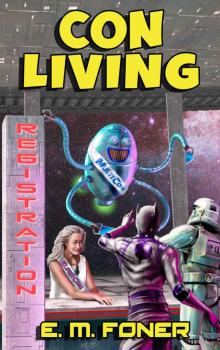 Con Living
Con Living Freelance On The Galactic Tunnel Network
Freelance On The Galactic Tunnel Network Career Night on Union Station
Career Night on Union Station Career Night on Union Station (EarthCent Ambassador Book 15)
Career Night on Union Station (EarthCent Ambassador Book 15) Word Night on Union Station (EarthCent Ambassador Book 9)
Word Night on Union Station (EarthCent Ambassador Book 9)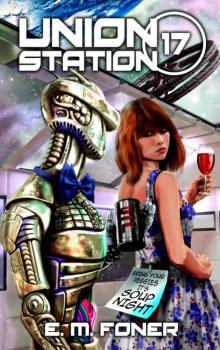 Soup Night on Union Station
Soup Night on Union Station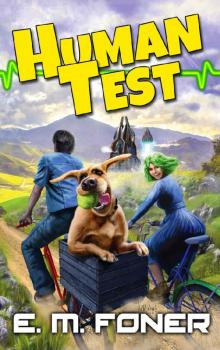 Human Test
Human Test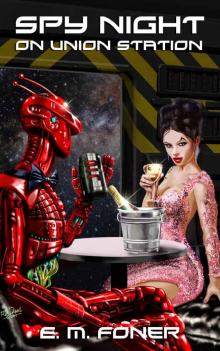 Spy Night on Union Station (EarthCent Ambassador Book 4)
Spy Night on Union Station (EarthCent Ambassador Book 4) Family Night on Union Station (EarthCent Ambassador Book 12)
Family Night on Union Station (EarthCent Ambassador Book 12) Party Night on Union Station (EarthCent Ambassador Book 10)
Party Night on Union Station (EarthCent Ambassador Book 10)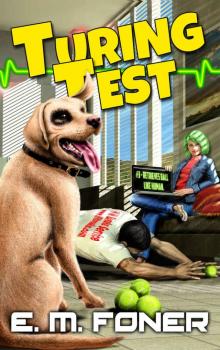 Turing Test
Turing Test Alien Night on Union Station (EarthCent Ambassador Book 2)
Alien Night on Union Station (EarthCent Ambassador Book 2) Wanderers On Union Station (EarthCent Ambassador Book 6)
Wanderers On Union Station (EarthCent Ambassador Book 6) Vacation on Union Station (EarthCent Ambassador Book 7)
Vacation on Union Station (EarthCent Ambassador Book 7) Book Night on Union Station (EarthCent Ambassasor 13)
Book Night on Union Station (EarthCent Ambassasor 13) LARP Night on Union Station
LARP Night on Union Station Carnival On Union Station (EarthCent Ambassador Book 5)
Carnival On Union Station (EarthCent Ambassador Book 5) LARP Night on Union Station (EarthCent Ambassador Book 14)
LARP Night on Union Station (EarthCent Ambassador Book 14) Book Night on Union Station
Book Night on Union Station High Priest on Union Station (EarthCent Ambassador Book 3)
High Priest on Union Station (EarthCent Ambassador Book 3) Meghan's Dragon
Meghan's Dragon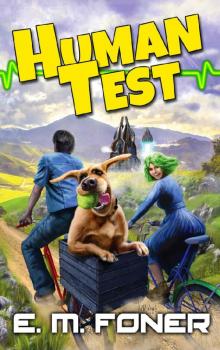 Human Test (AI Diaries Book 2)
Human Test (AI Diaries Book 2) Guest Night on Union Station
Guest Night on Union Station Date Night on Union Station
Date Night on Union Station